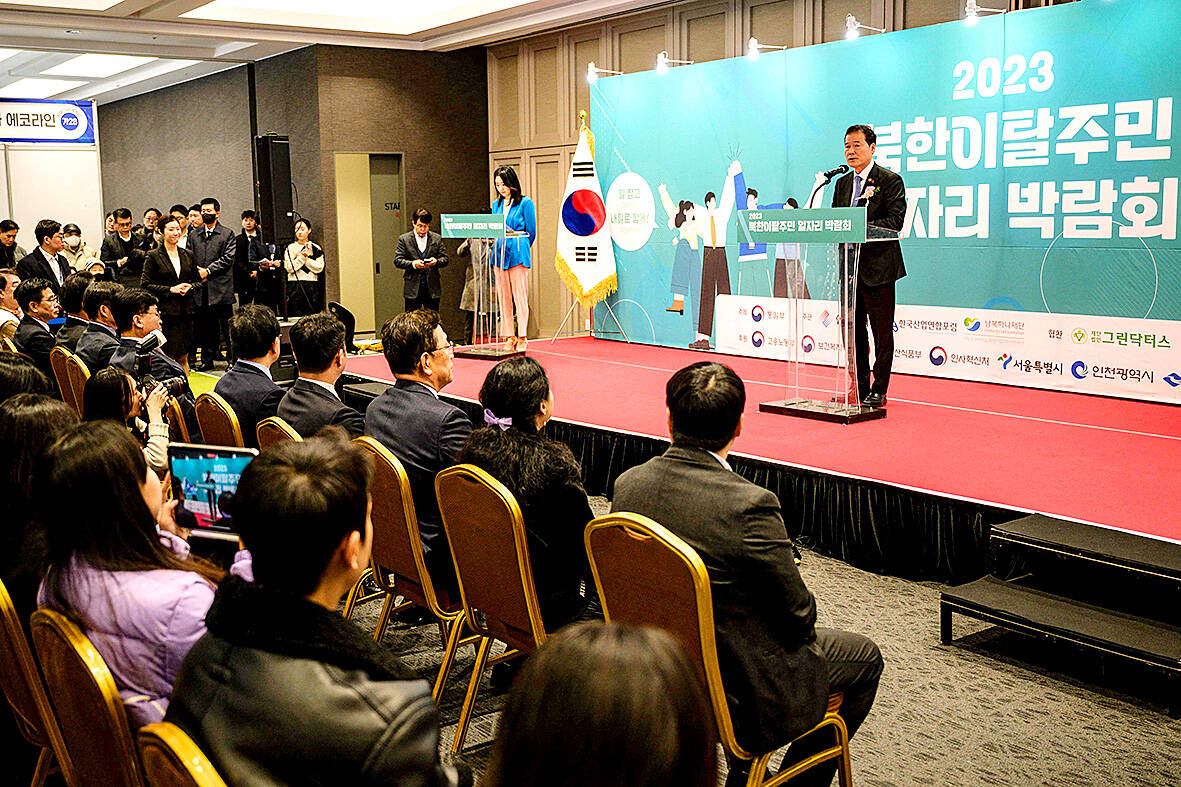One stormy night in May, Kim loaded his family into his home-made wooden boat and sailed away from North Korea, hoping to give his children a life of freedom.
Tens of thousands of North Koreans have fled to South Korea since the peninsula was divided by war in the 1950s, but most go overland to neighboring China first.
Defecting by sea is extremely rare and seen as far more dangerous than land routes, with only a handful of people making it across the de facto maritime border, the Northern Limit line.

Photo: AFP
But Kim, a 31-year-old fisherman who asked that AFP use only his surname for security reasons, was confident he could pull it off — and, after two failed attempts, he finally managed to get his family of nine out of the country.
For months, he studied border patrol patterns and waited until an opportunity arose: when North Korea started lifting its coastal blockades after the COVID pandemic lockdown.
“I studied the terrain and weather conditions and set out on the worst night when there was a sea warning in effect,” he said.

Photo: AFP
Everyone in his family — even his three-year-old — worked together to ensure the success of their escape, he said.
‘ANYTHING IS POSSIBLE’
“It feels like I was born a second time,” Kim said.
“In the North, planes flying in the sky were something I only saw in my dreams, in movies and in TV dramas, but now I can actually ride it and it feels like I’ve been born in my next life.”
After months of debriefing, Kim is now ready to move on with his new life, and attended a major job fair for North Koreans organized by authorities in South Korea — the first such event in nine years.
Some defectors have struggled to integrate. Decades of division coupled with South Korea’s rapid economic development, mean there are linguistic, cultural and practical challenges to overcome.
The job fair is one of many initiatives organized by the government that seek to assist defectors.
Kim was visibly blown away by dozens of job possibilities at the fair held at the COEX Convention Centre, in which about 100 companies and public institutions took part.
“Since I come directly from the North, I’m quite surprised that such a culture exists,” he said, clutching a pile of employment brochures.
Kim, who spent years working in North Korea’s fishing industry, said he had long dreamed of being a ship navigator — something that was impossible in his former home. North Korea’s shipping industry is tightly controlled, with access to jobs very restricted, and dependent on having the right background and connections.
“For ordinary people, (becoming a navigator) could only be a grandiose dream,” Kim said.
“But here, I heard that anything is possible if you put in a little effort, so I’m going to give it a try.”
‘ABSURD BRAINWASHING’
Kim had led a quiet, diligent life in North Korea, working towards owning his own boat one day.
He started off as a crew member on a fishing boat and then learned to dive to make more money.
Kim eventually earned enough to build a wooden boat, which he operated for around five years before setting out on his risky sea voyage to South Korea.
He said that he decided to defect after his children returned home one day from an “absurd brainwashing session.”
“I wanted them to be able to do, to say, and to see whatever they want, which basically does not exist in North Korea,” Kim said.
“I wanted to show them that there is a better world, that there is a bigger world out there,” he said.
“You can lead a stable life in North Korea now if you plan well and work hard, but there is no freedom.”

Last week the story of the giant illegal crater dug in Kaohsiung’s Meinong District (美濃) emerged into the public consciousness. The site was used for sand and gravel extraction, and then filled with construction waste. Locals referred to it sardonically as the “Meinong Grand Canyon,” according to media reports, because it was 2 hectares in length and 10 meters deep. The land involved included both state-owned and local farm land. Local media said that the site had generated NT$300 million in profits, against fines of a few million and the loss of some excavators. OFFICIAL CORRUPTION? The site had been seized

Next week, candidates will officially register to run for chair of the Chinese Nationalist Party (KMT). By the end of Friday, we will know who has registered for the Oct. 18 election. The number of declared candidates has been fluctuating daily. Some candidates registering may be disqualified, so the final list may be in flux for weeks. The list of likely candidates ranges from deep blue to deeper blue to deepest blue, bordering on red (pro-Chinese Communist Party, CCP). Unless current Chairman Eric Chu (朱立倫) can be convinced to run for re-election, the party looks likely to shift towards more hardline

Sept. 15 to Sept. 21 A Bhutanese princess caught at Taoyuan Airport with 22 rhino horns — worth about NT$31 million today — might have been just another curious front-page story. But the Sept. 17, 1993 incident came at a sensitive moment. Taiwan, dubbed “Die-wan” by the British conservationist group Environmental Investigation Agency (EIA), was under international fire for being a major hub for rhino horn. Just 10 days earlier, US secretary of the interior Bruce Babbitt had recommended sanctions against Taiwan for its “failure to end its participation in rhinoceros horn trade.” Even though Taiwan had restricted imports since 1985 and enacted

The depressing numbers continue to pile up, like casualty lists after a lost battle. This week, after the government announced the 19th straight month of population decline, the Ministry of the Interior said that Taiwan is expected to lose 6.67 million workers in two waves of retirement over the next 15 years. According to the Ministry of Labor (MOL), Taiwan has a workforce of 11.6 million (as of July). The over-15 population was 20.244 million last year. EARLY RETIREMENT Early retirement is going to make these waves a tsunami. According to the Directorate General of Budget Accounting and Statistics (DGBAS), the